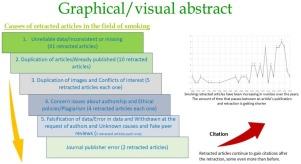吸烟领域撤回文章的趋势和特征:一项观察性研究
Q4 Medicine
引用次数: 0
摘要
目的探讨吸烟相关文献的撤稿原因及撤稿率。材料和方法我们进行了一项观察性研究,并检索了最大的已撤稿文章数据库。结果从1988年到2024年共发现83篇被撤稿的论文。根据文献类型(文献类型学),以原创文章居多(74篇)。这83份文件已经在65个不同的期刊上被撤回。通过检索Web of Science (WoS)和Scopus对撤稿论文的引用计数进行了检查,我们观察到,在WoS数据库中可用的68篇文章中,有四分之一(26.5%)的引用增加了,尽管它们是撤稿作品。撤回的原因是不可靠的、不一致的、错误的、缺失的数据或不正确的结论;重复以前发表的文章;在文章或以前的文章中复制图像;利益冲突;伦理/抄袭政策和作者身份问题;伪造同行评议;数据伪造/数据错误;应作者要求撤回的文章;以及未知的撤稿原因和期刊出版商的错误。结论:数据不可靠、不一致、不准确或缺失;错误的结论;或重复/已发表的文章;影像复制;利益冲突是撤稿的主要原因。近年来,撤稿文章的数量一直在增加,此外,文章发表和撤稿之间的时间也越来越短。我们证实撤回的文章确实在撤回后继续获得引用,有些甚至比之前更多。本文章由计算机程序翻译,如有差异,请以英文原文为准。

Trends and Characteristics of Retracted Articles in the Smoking Field: An Observational Study
Objective
The aim was to examine reasons for retraction and rates of article retraction in the field of smoking.
Material and methods
We conducted an observational study and searched the largest database of articles that have been retracted.
Results
We found 83 papers that were retracted from 1988 to 2024. According to the type of document (documents typologies), the majority were original articles (74 papers). The 83 documents have been retracted in 65 different journals. The retracted papers’ citation counts were examined by searching Web of Science (WoS) and Scopus, and we have observed that a quarter (26.5%) of the 68 articles available in the WoS database had increased their citations, despite the fact that they were retracted works. The reasons for retraction were unreliable, inconsistent, erroneous, or missing data or an incorrect conclusion; duplication of previously published articles; duplication of images into the articles or in previous articles; conflicts of interest; the ethical/plagiarism policy and authorship issues concerns; fake peer reviews; data falsification/data error; articles retracted at the authors’ request; and unknown causes of retraction and journal publisher's error.
Conclusions
Unreliable, inconsistent, inaccurate, or missing data; an incorrect conclusion; or duplication/already published articles; duplication of images; and conflicts of interest are the main causes of retractions. Retracted articles have been increasing in number over the years, and additionally, the amount of time that passes between an article's publication and retraction is getting shorter. We verify that retracted articles indeed continue to gain citations after the retraction, some even more than before.
求助全文
通过发布文献求助,成功后即可免费获取论文全文。
去求助
来源期刊

Open Respiratory Archives
Medicine-Pulmonary and Respiratory Medicine
CiteScore
1.10
自引率
0.00%
发文量
58
审稿时长
51 days
 求助内容:
求助内容: 应助结果提醒方式:
应助结果提醒方式:


